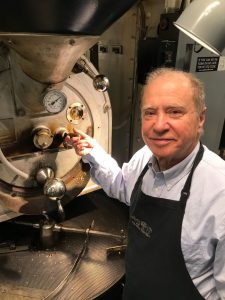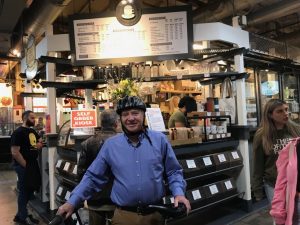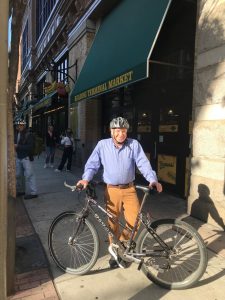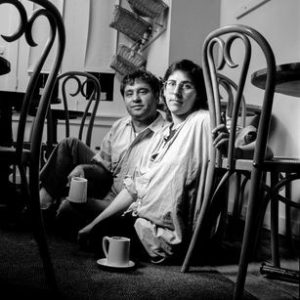
A self-described “jack of all trades,” Jack Treatman, owner of Old City Coffee, starts his day early. Always with a cup of top-notch coffee, but we’ll get to that later.
Born in 1957 as the oldest of five children, Treatman gravitated toward the kitchen early: “My mother was not a good cook and we all liked to eat, so I emerged as the family cook.”
His mother came from a family of academics, and his father’s family was in the hosiery business, located in what was then called the “Wholesale District” — now Old City. The hosiery business was difficult: The Treatmans started off providing repairs and selling seconds and, eventually, his father designed a line of hosiery sold in area retail stores.
Treatman attended what was then called the Philadelphia College of Textiles and Science with a plan to join the family business.
And, for a time, he did. He graduated from Textile and worked in the hosiery business. But his timing was unfortunate; by the mid-1980s, that type of manufacturing in the city was dying, and small retail was following suit. But he does not look back on the time with regret — quite the opposite.
In addition to the experience he gleaned from working in the family business, Treatman met his future wife.
Ruth Isaac had opened Old City Coffee on Church Street, and Treatman loved coffee. He soon discovered that he loved her, too.

Treatman kvells about Isaac’s courage and spirit in launching the business.
“She was truly a pioneer,” he said. “In those days, there was no infrastructure to source coffee beans. No specialty coffee customer base. People didn’t even know what a cappuccino was. She roasted the beans in the back of her shop.”
While Treatman became a loyal customer, he also realized that his future didn’t lie in the hosiery business.
He was a self-taught cook who had garnered coffee knowledge through a management internship at Linton’s restaurant, an old Philadelphia institution known for a great cup of coffee. While there, he learned from a waitress that the “secret” to a great cup of coffee was the proportion; the accepted convention was to use a full basket of grounds with four pitchers of water.
The savvy waitress revealed to Treatman that the key was to reduce the water to three pitchers, resulting in a much stronger, more flavorful cup. Treatman soon took his passion for food — “coffee was along for the ride” — and entered the Culinary Institute of America’s accelerated program.
There, he learned garde manger, a lot of culinary skills and baking techniques and, coming out, he landed a job at the American Diner in Princeton, New Jersey. When the commute became unmanageable, he joined the staff of the White Dog Café.
Around that time, Isaac decided to expand Old City Coffee, adding a location at Reading Terminal Market and needing more hands on deck.
The couple married in 1988 and, a year later, Treatman left White Dog and joined Old City Coffee.

They bought a vintage Probat coffee roaster to roast beans on-site, and the machine still operates today. In 1990, Treatman and Isaac acquired the space adjacent to the original Old City Coffee location on Church Street and expanded into a European-style café, which is still going strong.
That year, they also expanded their family with the birth of their first child, Mira, and, three years later, Reuben. When asked if the next generation joined the family business, Treatman laughed, “They worked behind the counter briefly, but they were not interested in coffee!”
Their first grandson, Jerome, arrived recently, bringing the joys of grandparenthood to Treatman and Isaac, a new adventure they’re thoroughly enjoying.
Treatman maintains memberships in two synagogues: Society Hill Synagogue and Congregation Beth Or in Maple Glen, adding, “It’s a long story.”
The family lives in the Society Hill area and has been members there for years. Their children went through preschool, Hebrew school and bar/bat mitzvah programs there, but when it came time for Hebrew high school, there weren’t sufficient student numbers to sustain the classes. The family joined Congregation Rodeph Shalom so their son could attend a high school program. While there, Isaac became close to the cantor and, when she left to go to Beth Or, the Treatmans followed.
“Judaism guides everything I do. I became much more observant in 1999 after my mother passed. I wanted to do the yahrzeit regularly and, as a result, engaged more fully with the synagogue,” Treatman said.
He served as president of Society Hill Synagogue from 2002-2003, an experience he describes as “a big responsibility, but one I was happy to do for the community. It was an education — my business benefited from the lessons I learned, hopefully not at the expense of the synagogue!” he said.

Treatman described his approach to life: “I’m very hands-on. I’m not a theoretical or academic type — I need to dig into things and keep moving. I go where I’m needed, I try to teach what I know that has proven useful to me, and I try to model good behavior and set a good example.”
When asked about his typical day, Treatman noted, “When you are a small business owner, there’s no such thing. The first few hours might be spent in front of the computer with emails, orders, inventory — but if someone calls out sick, I’m opening the store and serving customers. If a machine breaks, I’m dealing with a repair.”
He does start every morning with a cup of coffee — a pour-over, or manual drip, which he describes as “the best method” because it allows you to pour the hot water around the grounds that creep up during the brewing process to ensure that all the coffee is used and its flavor extracted. His other “musts” include the right proportion (6 ounces of water with 2 tablespoons of coffee per cup), sufficient temperature (above 200 degrees F), absolute cleanliness of the equipment, quality of water (filtered) and, of course, the beans.
“An operation like ours doesn’t allow for travel to coffee farms to scout out beans in far-flung places, but we do know some farmers personally, particularly in Hawaii, and we have some direct relationships,” he said. “For beans from other locations, we rely on reputable coffee brokers, who bring green, unroasted beans back for us, and we roast them and then assemble our staff for tastings and selection.”
When his seven-day workweek affords some leisure time, Treatman heads to nature. A lover of the outdoors, he enjoys long trail rides on his bike but can also be found whizzing around the city on two wheels. He walks five miles a day in his normal routine moving from store to store, making the rounds.
“I am truly blessed. I have a great staff, a wonderful family and a business that I love,” he said. “What more could you want?” ■



